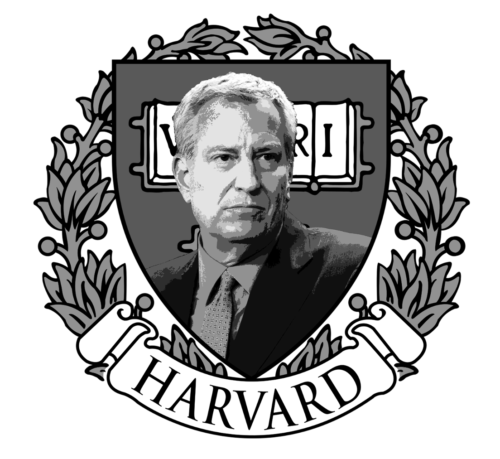The Harvard Institute of Politics holds that former New York City mayor Bill de Blasio will be an asset to the institute this fall. But some students are doubtful, citing his contentious political record.
As part of the IOP’s Visiting Fellow program, de Blasio is required to visit for a short but intensive period during the semester, participating in up to three events a day and holding small study groups with students.
“Mayor de Blasio’s decades of experience in local government, federal agencies, national campaigns, and running the largest city in the country will provide invaluable insight to our students and the Harvard community,” IOP Interim Director Setti Warren shared in a press release.
De Blasio’s tenure in politics began in 2002 when he served on the New York City Council as a representative for the 39th district in Brooklyn. He held the position of New York City Public Advocate from 2010 to 2013 and served as the 109th mayor of the city from 2014 to 2021, subsequently running for president of the United States in 2020 and for Congress in 2022. He dropped out of both races due to low polling.
Jack Silvers ’25, who is part of the IOP’s John F. Kennedy Jr. Forum and a resident of Scarsdale, New York, said he was “puzzled” when he found out about de Blasio’s fellowship. “As a New Yorker who watched him try to will himself into a higher job than major for years, it’s not that surprising he would want to be involved with Harvard somehow,” Silvers said. But he was not entirely opposed to de Blasio’s fellowship, and cited the extensive political experience he brings to the role.
“His past is complicated and who knows what his legacy will be like. I hope students engage with his study group. I just worry about the stigma from his presidential run and antics as mayor.”
As New York City mayor, de Blasio created democratic reforms in education, reduced stop and frisk encounters, and increased Covid-19 vaccinations. Most notably, de Blasio expanded universal public pre-Kindergarten to include four-year-olds, increased the minimum wage to $15/hour, and built and preserved 200,000 affordable apartments.
However, the former mayor has been criticized for failing to help New York solve other problems. Shootings and homicides increased to nearly twice their pre-pandemic levels as of last fall. A disproportionate 86% of people stopped by the police were Black or Latino, and 61% were later found innocent. The number of single adults living in shelters increased by 65%. Seventy percent of schools are still segregated.
In a press release, de Blasio expressed his enthusiasm for his new role. “I am happy to join the IOP to help inspire our nation’s next generation of leaders to find ways to serve in politics and public service, and to build a government that serves working people.”
This statement echoes his campaign slogan of putting “working people first,” which made some students wonder if Harvard is just another pawn in de Blasio’s game of political chess.
Lucas Gazianis ’24, who participated in the Fellows and Study Groups program last semester and works with the IOP Policy Program, looks forward to learning from de Blasio, regardless of his track record. “Whether or not de Blasio was a good mayor, he can still be a valuable fellow,” said Gazianis. “Anyone who leads New York City has an array of highly unique experiences, and as long as de Blasio is a patient and candid teacher, students will likely get a lot out of his fellowship.”
The IOP does not choose fellows based on their popularity, Gazianis explained. “An IOP fellowship is not a way of endorsing the record of certain public figures. Rather, it seeks to expose students to a number of leaders in different realms of public service.”
Hannah Davis ’25 (hannahdavis@college.harvard.edu) is excited to attend some of the former New York City mayor’s events this semester.

